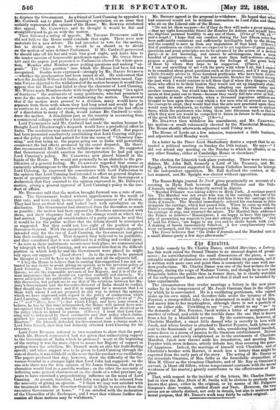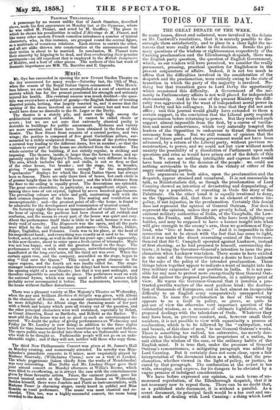tyr thtliTt5.
A little comedy by Mr. Charles Dance, entitled Marriage, a lottery, has this week raised the Strand Theatre to an unusual degree of promi- nence; for notwithstanding the small dimensions of the piece, a con- siderable number of characters are introduced within its precincts, and it is written with more care and point than is commonly the case with mo- dern productions. Mr. Charles Dance was one of the best writers for the Olympic, during the reign of Madame Vestris, and though he is now less frequently before the public than in former days, he is clearly watchful of his early-acquired fame, and resolved that it shall not be tarnished by later experiments. The circumstances that render marriage a lottery in the new piece rather lie in the temperament of Mr. Jacob Omnium than in the objects by which he is surrounded. He is a vacillating gentleman, who cannot make up his own mind, and therefore falls under the tyranny of Mrs. Poynter, a strong-willed lady, who is determined to make it up for him, and marry him to her stepdaughter, although there is not a particle of love on either side. Unwilling to say "yes," afraid to say "no" to the demands of Mrs. Poynter, Jacob writes a letter of acceptance and another of refusal, and sends to the terrible dame the one that is drawn from a hat by a blindfolded servant. By the contrivance, however, of Charlotte Manifest, a smart little damsel who is secretly in love with Jacob, and whose brother is attached to Harriet Poynter, both letters are sent to the Semiramis of private life, who, considering herself insulted, comes down in a storm of passion to the Omnium establishment. Driven into a corner, and newly enlightened as to the sentiments of Charlotte Manifest, Jacob now throws aside his irresolution, and meeting Mee Poynter with stern defiance, utterly defeats her, thus securing the gene- ral happiness. Indeed, the marriage of himself with Charlotte, and of Charlotte's brother with Harriet, is much less a lottery than might be expected from the early part of the story. The acting of Mr. Emery as the irresolute Omnium, of Mrs. Selby as the formidable stepmother, of Miss M. Oliver as the vivacious Charlotte, and of Mr. Ray as Otmuum s servant, (a blunt old fellow, whose temperament contrasts with the moral weakness of his master,) greatly contributes to the effectiveness of the piece.
That, with respect to the incident of the letters, Mr. Charles Dance had in view the Hon Etoik of M. Scribe will be obvious to anybody who knows that piece, either in the original, or by means of Mr. Palgraee Simpson's close version, entitled Heads and Tails. However, the two pieces are so utterly distinct, not only in details, but also in motives and moral purpose, that Mr. Dance's work may fairly be called original.
TAICISTAN THEATRICLI.8.
A personage by no means unlike that of Jacob Omninm, described above, made his first appearance on Monday last at the Gymnase, where be was called M. Plumet, and acted by M. Geoffrey. The piece in which he shows his peculiarities is called L' Hdritage de M. Plumet, and like many other modern French comedies introduces a number of typical characters, who, in this instance, are grouped round the central figure, as a multitude of voracious relations. Each strives to outwit the other, and all are alike thrown into consternation at the announcement that their victim is about to be married. In conclusion, M. Plumet tests their sincerity by feigning to be dead, and thus overhearing their genuine eentiments—an old expedient that is employed in the Malade linaginaire of Moliere, and a host of other pieces. The authors of this last work of dramatic importance are MK h. Barriere and E. Capendu.



























 Previous page
Previous page